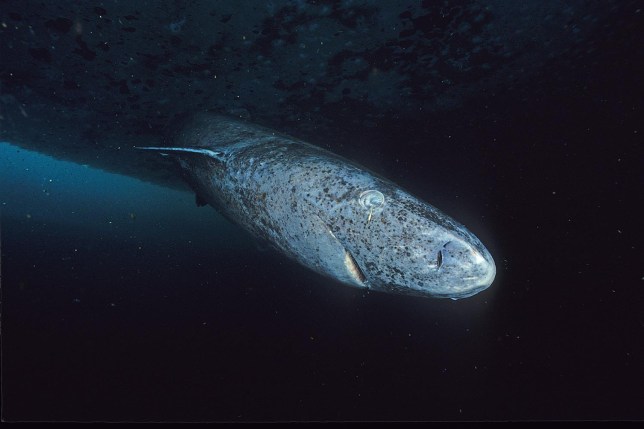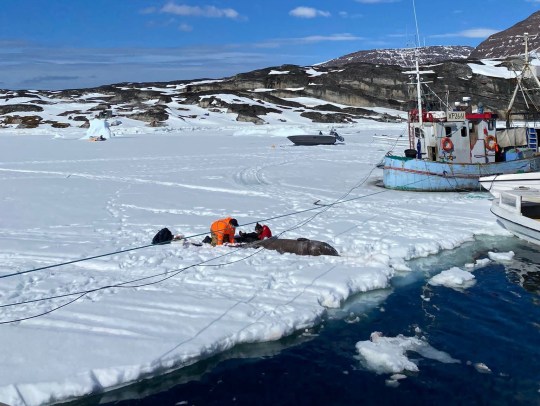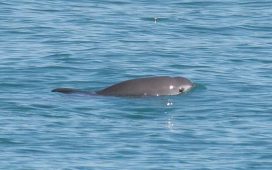A rare shark species that lives for up to 500 years could hold key anti-ageing secrets to extend human lifespans – and possibly boost their reputation.
The Greenland shark is a curious creature, both in looks and behaviour.
It was described in the New Yorker as one of nature’s ‘least elegant inventions’.
‘Lumpish, with stunted pectoral fins that they use for ponderously slow swimming in cold and dark Arctic waters, they have blunt snouts and gaping mouths that give them an unfortunate, dull-witted appearance,’ the character assassination continued. ‘Many live with worm-like parasites that dangle repulsively from their corneas.’
Yes, that is pretty gross, but they also around 270 years – if not much longer – so who’s really winning?
Now, new research has shown that metabolic activity in their muscles may be an important factor in the incredible longevity of the Greenland shark (Somniosus microcephalus), the world’s longest-living vertebrate species.
The findings may have applications for conservation of the vulnerable species against climate change – or even for human cardiovascular health, say scientists.
Lead researcher Ewan Camplisson said: ‘We want to understand what adaptations they have that allow them to live so long.’
It was previously thought that their long lifespan was due to the sharks’ cold environment and minimal movement.
But the factors behind the species’ extreme longevity appear to be far more complex, prompting researchers to investigate alternative theories.
Mr Camplisson, a PhD student at the University of Manchester, said: ‘Most species show variation in their metabolism when they age.
‘We wanted to determine if Greenland sharks also show this traditional sign of ageing or if their metabolism remains unaltered over time.’
To measure the metabolism of the sharks, Mr Camplisson and his team conducted enzyme tests on preserved muscle tissue samples from Greenland sharks.
Follow Metro on WhatsApp to be the first to get all the latest news
Metro’s on Whatsapp! Join our community for breaking news and juicy stories.
They measured the metabolic activity of the enzymes with a spectrophotometer across several different shark ages and environmental temperatures.
The team found no significant variation in muscle metabolic activity across different ages, suggesting that the metabolism does not appear to decrease over time, and may play a key role in their longevity.
‘This is quite different to most animals which tend to show some variation in their metabolic enzyme activity as they age,’ said Mr Camplisson.
Greenland sharks: the lowdown
Greenland sharks lives extraordinarily long lives, many living to around 270 years but potentially reaching 500.
The presence of radioactive isotopes in their eyes from nuclear bombs has been used to help age them.
The sharks grow very slowly, less than 1cm a year. Most reach between two and four metres long.
They are the only sharks that can withstand the cold Arctic waters all year round, and have been known to dive as deep as 2,200 metres.
However, they do so slowly, moving at less than two miles an hour.
They are carnivores, eating fish, smaller sharks and eels, although seabirds, reindeer and horses have also been found in their stomachs, presumably after falling through the ice.
The only known possible attack by a Greenland shark on a human dates back to 1859 – they don’t typically swim in the same circles.
‘The results support our hypothesis that the Greenland shark does not show the same traditional signs of ageing as other animals.’
The findings also show that the Greenland shark’s metabolic enzymes were ‘significantly’ more active at higher temperatures.
‘This would suggest that the shark’s red muscle metabolism is not specially adapted for the polar environment, otherwise we would have expected to see less of a temperature related difference in activity,’ said Mr Camplisson.
The researchers warned that in a world with a rapidly changing climate, long-lived species that are less able to adapt may be the most at risk of extinction.
Mr Camplisson said: ‘A female Greenland shark may not become sexually mature until it is 150-years-old, and with such a long generation time, the species will have far less of a chance to adapt to anthropogenic changes in their environment.’
Now he plans to test more enzymes and tissue types to gain an even deeper understanding of the shark’s metabolic activity.
‘My ultimate goal is to protect the species and the best way to do this is to better understand them,’ he said.
He is also interested in the possible applications of the findings for the understanding of human heart disease.
Mr Camplisson added: ‘By studying the Greenland shark and its heart, we may be able to better understand our own cardiovascular health.
‘These are issues that become progressively more common and severe with increasing age.’
The findings were presented at the Society for Experimental Biology annual conference in Prague, Czech Republic.
MORE : Man finds wife’s feet sticking out of python after she went missing on walk
MORE : ‘Gruesome’ remains of 12-year-old found after crocodile attack
MORE : Man trapped in sewer for three days is rescued after walker heard cries for help
Get your need-to-know
latest news, feel-good stories, analysis and more
This site is protected by reCAPTCHA and the Google Privacy Policy and Terms of Service apply.









